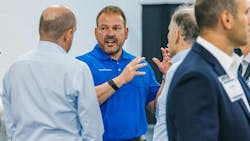The future of transportation is a shared effort
In the transportation industry, challenges are constant, but today, they’re converging in more complex ways. Supply chain volatility, labor shortages, rising customer expectations and economic uncertainty have created an environment where traditional approaches no longer suffice. We can’t wait for external forces to stabilize. Now is the time to lead with clarity, creativity, and collective resolve.
At Wabash, we believe innovation doesn’t happen in isolation. That’s why we convened our second Ignite user event last year, bringing together customers, dealers, suppliers, and partners to spark new thinking and drive action. I spoke candidly about the urgent need for practical, scalable solutions. But that’s not easy when everyone is also chasing their own competitive edge. Proprietary strategies might win short-term gains, but they rarely move the industry forward in meaningful ways.
We’re facing a choice: continue business as usual, or rethink how we problem-solve—together. Here’s how we’re choosing to lead.
Break down silos to accelerate progress
No single organization can solve the industry’s biggest challenges alone. Real impact requires cross-functional and cross-company collaboration. That starts by breaking down silos—both within our own organizations and across the broader ecosystem of partners.
Wabash recently hosted a supplier symposium designed to integrate partner insights earlier in the product development process. By aligning around a shared purpose and being transparent about what’s at stake, we created space for meaningful, solutions-focused dialogue.
This kind of collaboration shifts the conversation. It opens the door to deeper partner engagement—asking better questions, uncovering unmet needs and co-creating solutions that actually solve the problems our customers face every day.
Tap the power of collective problem-solving
Once the ecosystem is aligned, the real work begins. One tool we’ve found valuable is Value Engineering/Value Analysis (VAVE)—a structured, collaborative approach originally developed by General Electric during the 1940s to address wartime material shortages, and now widely used in industries like automotive.
VAVE principles apply well in transportation:
- Start with functions, not parts
- Design to cost, not costs for design
- Cross-functional collaboration
- Data-driven creativity
- Customer-centric thinking
In a highly competitive, cost-sensitive global market, VAVE allows us to balance innovation with execution, delivering solutions that are both smarter and more sustainable.
Build for the future—together
Transformation doesn’t happen by accident. It takes intention, curiosity and courage. At Wabash, we’re deepening our partnerships with technology startups, academic institutions, and third-party testing facilities to bring new ideas to life, faster.
We encourage others in the industry to do the same. Reach beyond the obvious partners. Engage the next generation of talent. Tap into federally funded research opportunities. Set a clear direction and then invite others to help build it.
To make collaboration successful:
- Start planning early for in-person sessions to bring teams together.
- Avoid trying to boil the ocean; focus on specific, high-impact areas.
- Cast a wide net but curate a group of committed participants.
- Share background information and expectations for each team/partner.
- Assign roles and responsibilities in the planning phase. Be clear on the request and provide clear instructions on what is being asked of any participants.
- Use technology to engage participants in advance of in-person events.
- Lean into each participant’s area of expertise.
- Follow through; share results and keep the dialogue going.
Interest in sustainability, uptime, thermal performance, and autonomous vehicles is reshaping what customers expect from transportation partners. To meet the moment, we must reject incrementalism. This is the time to lead boldly, work together, and pursue solutions that are equal to the challenges ahead.
About the Author

Brent Yeagy
Wabash President and CEO Brent Yeagy boasts more than 25 years of experience in the automotive and commercial transportation industries.
